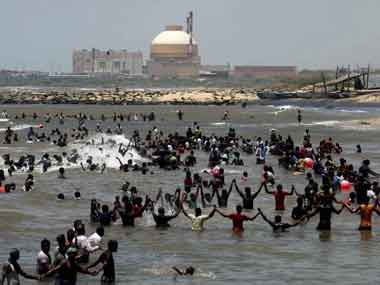A new public interest litigation (PIL) has be filed in the Supreme Court against the Kudankulam nuclear power plant by Common Cause, the Centre for Public Interest Litigation (CPIL), EAS Sarma, a former secretary to the government of India, and G Sunderrajan, a social activist and lead petitioner. The main issue raised in the PIL is whether the Russians can escape all liabilities for the plant when the Supreme Court has already laid down a fundamental principle that if there is pollution or other damage to the environment, it is the polluter who is absolutely liable. In the case of Kudankulam, the government of India has indemnified the Russians against any payment in case there is an accident at the nuclear plant. The government entered into an agreement with the Russians to take on all financial liabilities in case of an accident. [caption id=“attachment_459020” align=“alignleft” width=“380”]
 Jal Satyagraha at Kudankulam. PTI[/caption] The petitioners have asked the Supreme Court to clarify if the principle—that “absolute liability lies with the polluter”—is applicable in the Kudankulam case. If it does, it is the Russians and not the Indian government which would be held responsible for any nuclear accident. The petition says that “the Kudankulam nuclear plant would be governed by the law of the land as laid down by this honourable court, that is, the constitutional principles of absolute liability and polluter pays principle”. The petition points out that the “Civil Liability for Nuclear Damage Act 2010 channels the liability of a nuclear accident to the operator (government undertaking) of the said plant and then limits the same at Rs 1,500 crore. Though the said Act imposes very minimal liability on the nuclear reactor supplier/manufacturer (putting to grave risk the safety of power plants) in violation of the ‘polluter pays’ and ‘absolute liability principle’, the government has exempted the Russian company from even this minimal liability by giving the Russians an undertaking that Indian taxpayers would foot the bill, says the petition. “Also, any action of the executive that requires expenditure from the exchequer (in case of a nuclear accident, this would run into lakhs of crores of rupees) would require parliamentary approval as per the Constitution. No such approval has been taken,” the petition adds. Raising questions of law, the petition asks the Supreme Court for interim relief by directing the Indian government to produce all agreements signed with Russia over the Kudankulam nuclear plant. It questions the government’s power to underwrite the potential liability of a nuclear reactor supplier and thus shifting the burden to the public exchequer. The PIL also asks the court to direct that the Russian party should not be excluded from its liabilities in case of an accident. The petition is likely to come up for hearing on Thursday. The Supreme Court is already considering another Kudankulam nuclear plant petition about its safety. Both the petitions are essentially seeking a stay, till the government clarifies its agreement with the Russians.
Jal Satyagraha at Kudankulam. PTI[/caption] The petitioners have asked the Supreme Court to clarify if the principle—that “absolute liability lies with the polluter”—is applicable in the Kudankulam case. If it does, it is the Russians and not the Indian government which would be held responsible for any nuclear accident. The petition says that “the Kudankulam nuclear plant would be governed by the law of the land as laid down by this honourable court, that is, the constitutional principles of absolute liability and polluter pays principle”. The petition points out that the “Civil Liability for Nuclear Damage Act 2010 channels the liability of a nuclear accident to the operator (government undertaking) of the said plant and then limits the same at Rs 1,500 crore. Though the said Act imposes very minimal liability on the nuclear reactor supplier/manufacturer (putting to grave risk the safety of power plants) in violation of the ‘polluter pays’ and ‘absolute liability principle’, the government has exempted the Russian company from even this minimal liability by giving the Russians an undertaking that Indian taxpayers would foot the bill, says the petition. “Also, any action of the executive that requires expenditure from the exchequer (in case of a nuclear accident, this would run into lakhs of crores of rupees) would require parliamentary approval as per the Constitution. No such approval has been taken,” the petition adds. Raising questions of law, the petition asks the Supreme Court for interim relief by directing the Indian government to produce all agreements signed with Russia over the Kudankulam nuclear plant. It questions the government’s power to underwrite the potential liability of a nuclear reactor supplier and thus shifting the burden to the public exchequer. The PIL also asks the court to direct that the Russian party should not be excluded from its liabilities in case of an accident. The petition is likely to come up for hearing on Thursday. The Supreme Court is already considering another Kudankulam nuclear plant petition about its safety. Both the petitions are essentially seeking a stay, till the government clarifies its agreement with the Russians.
Another Kudankulam PIL in SC seeks to make Russia liable
Raman Kirpal
• September 17, 2012, 21:56:35 IST
A second PIL has been filed in the SC asking it to clarify if Russia can escape the liability clause in case of accidents.
Advertisement
)
End of Article